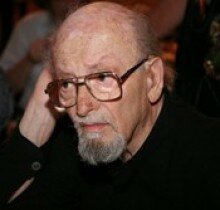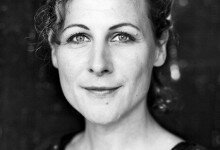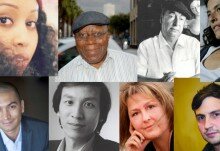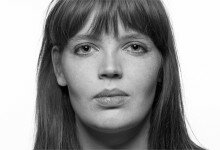
Tuvia Ruebner was born into a semi-secular, German-speaking Jewish family (his father was a member of the Freemasons) in Bratislava, Slovakia in 1924. He completed only nine years of school: five in a Protestant elementary school, three in a German gymnasium and one in a Slovakian high school. After Jews were forbidden to attend school, he worked as an apprentice electrician. Ruebner immigrated to Mandatory Palestine in 1941, eventually settling in Kibbutz Merhavia; he continued to write in German for more than a decade, and published his first (of fifteen) poetry books in Hebrew in 1957.
Ruebner lost his family in the Holocaust, and later lost his wife and son to what are usually considered individual, unhistorical tragedies: his first wife was killed in a car accident and his son disappeared in South America while travelling. All these losses surface and re-surface in his poetry. Ruebner does not express a sense of belonging to the Israeli state as such, nor to the way Judaism currently manifests itself in Israel, but rather to the art of poetry. After the publication of a selection of his poems culled from nearly fifty years of writing (1957–2005), Ruebner told the newspaper Haaretz:
“I love the landscape of Israel, but inside I am connected more to the landscape of the Carpathians. [Israeli poet] Lea Goldberg wrote that there are two homelands [the one in which we are born and the one we choose]. I feel that I have two ‘no-homelands’. I was uprooted twice. A person can have only one homeland: the place where he was born. Slovakia spewed me out and what is happening in Israel today has uprooted me again [ . . . ] Zionist ideology saved my life in 1941, but that is not the point. I am here because I am here. Poetry became my homeland.”
The author also of an autobiography and a book of stunning photographs taken in Israel, Europe, Nepal and other places, Ruebner is Professor Emeritus of Comparative Literature at Haifa University. He is also a translator – of S.J. Agnon from Hebrew into German and of Goethe, Ludwig Strauss and Friedrich Schlegel from German into Hebrew.
In Israel, Ruebner has been awarded the Anne Frank Prize, the Jerusalem Prize, the Israel Prime Minister’s Prize for Literature (twice) and the prestigious Israel Prize (2008); abroad, he has received the D. Steinberg Prize (Zurich, 1981), the Christian Wagner Prize (Germany, 1994), the Jeannette Schocken Prize (Germany, 1999), the Paul Celan Translation Prize (1999), the Jan Smrek Prize (Slovakia) and the Theodor Kramer Prize (Austria 2008).
Bibliography
Books in Hebrew
Poetry
The Fire in the Stone, Tel Aviv, Sifriat Hapoalim, 1957
Poems Seeking Time, Tel Aviv, Sifriat Hapoalim, 1961
As Long As, Tel Aviv, Sifriat Hapoalim, 1967
Poems by Tuvia Ruebner, Tel Aviv, Ekked, 1970
No Return, Tel Aviv, Sifriat Hapoalim, 1970
Midnight Sun, Tel Aviv, Sifriat Hapoalim, 1977
Statue and Mask/A Graven and a Molten Image, Tel Aviv, Hakubbutz Hameuchad, 1982
And Hasteneth to his Place, Tel Aviv, Sifriat Hapoalim, 1990
Latter Day Poems, Tel Aviv, Keshev, 1999
Almost a Conversation, Tel Aviv, Keshev, 2002
Nasty Children’s Rhymes and More, www.tzivonim.com, Tzivonim, 2004
New & Selected Poems 1957-2005, Tel Aviv, Keshev, 2005
Everything Afterwards, Tel Aviv, Keshev, 2007
Belated Beauty, Tel Aviv, Keshev, 2009
Contradictory Poems, Ra’anana, Even Hoshen, 2011
Non-fiction
Lea Goldberg: A Monograph, Tel Aviv, Sifriat Hapoalim/Hakibbutz Hamuechad, 1980
A Long Short Life, (autobiography) Tel Aviv, Keshev, 2006
My Eyes Have Seen That Too, (photo album) Tel Aviv, Keshev, 2007
Works in translation
Poetry
In Swedish
Selected Poems, Stockholm, Tidens, 1977
In German
Selected Poems, Munich, Piper, 1990
Wuestenginster, Aachen, Rimbaud, 1990
Granatapfel, Aachen, Rimbaud, 1995
Rauchvoegel 1957-1997, Vol. 1, Aachen, Rimbaud, 1998
Stein will fliessen, Aachen, Rimbaud, 1999
Zypressenlicht 1957-1999, Vol. 2, Aachen, Rimbaud, 2000
Wer haelt diese Eile aus, Aachen, Rimbaud, 2007
Spaetes Lob der Schoenheit, Aachen, Rimbaud, 2010
Lichtsschatten, Aachen, Rimbaud, 2011
Non-fiction in German
Eine langes kurzes leben, Aachen, Rimbaud, 2004
Links
Interview with the poet in English: from Haaretz
Photo: Tuvia Ruebner’s work space by Tali Amitai-Tabib
Photos: Kibbutz Merhavia by Tuvia Ruebner
Excerpt in German from Ruebner’s autobiography
On Ruebner’s ekphrastic poetry in English: Look inside Ambassdors of Death by Shahar Bram
Video (in Hebrew): Reading at the Poetry Place One Square Meter Festival, Jerusalem, 23 June 2010
Audio: Popular songs based onTuvia Ruebner's protest poetry and a discussion with the poet (in Hebrew)
Sponsored by Poetry Place




